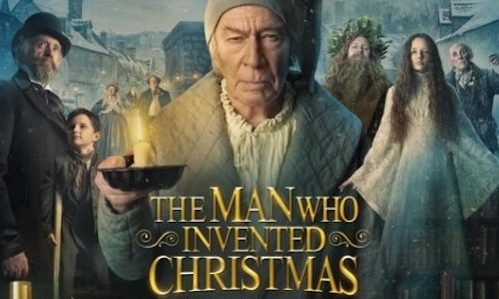Popular Posts
-
This review may contain spoilers! Most of this film feels like a cheesy extended tourist ad for Samoa. I would give Three Wise Cousins ...
-
This review may contain spoilers! Certainly quite a bizarre film, but it's originality and beautiful style sets it apart from many ...
-
This review may contain spoilers! If you love zombie films then you have to go check this out! I would give Train To Busan a 7/10. Th...
-
This review may contain spoilers! While not the greatest war film that I've ever seen, Michael Bay delivers an action packed glimps...
-
This review may contain spoilers! This film is probably one of the more thought provoking films Marvel has done and I'd say it cert...
Tuesday, 19 December 2017
The Man Who Invented Christmas
This review may contain spoilers!
Dan Stevens continues to prove himself to be nothing more than a powerhouse performer. I would give The Man Who Invented Christmas an 8.5/10.
There is something very commercial and rushed about Christmas films these days, entire features where a low budget shell of a narrative is thrown out to earn cash from the holiday season. I was pleasantly surprised and delighted by The Man Who Invented Christmas because it challenged the audience to think what goes into a story about Christmas; how do we build a moral in a story that matters to people. The depiction of A Christmas Carol has been done commercially an incredible amount of times by now and this is a nice return to the core idea behind the whole thing. You can't help but feel more connected to the nature of the famous story, it manages to feel both a homage and a fresh telling. The biographical component surrounding Charles Dickens is interesting and has a fine contrast to the development of his famous story. I thought the strength of the film lay in its presentation of Dickens' writing process and the internal struggle he has with his characters to craft his writing.
Christopher Plummer, who played Ebenezer Scrooge, is nigh merciless as the famed vindictive character; Plummer lends a darkness to the role that leads to some brilliant confrontation between Stevens and himself. Jonathan Pryce, who played John Dickens, is a rather charming role ultimately; Pryce does a fine job at subtly playing the more hapless aspects of his role so that you feel conflicted about him as an audience member. Simon Callow and Ian McNeice, who played Leech and Chapman respectively, immediately capture the fine respectable publishers of Dickens' works; these performers have an open sensibility and balance the moments in which their roles aid the protagonist or find themselves in conflict with him. Morfydd Clark, who played Kate Dickens, is a very energetic and commanding presence throughout the film; Clark's more intimate moments of upset or passion with Stevens are very moving. Miles Jupp, who played William Makepeace Thackeray, is a very arrogant, underhanded role that you love to hate; Jupp is a witty minor antagonist who develops an interesting dynamic with Stevens and Edwards. Anna Murphy, who played Tara, is a very spirited actress who imbues this film with the magic of storytelling; Murphy plays a real passion where it's needed to shift the plot in a more emotional direction. Justin Edwards, who played John Forster, is an immediately charismatic role with a great degree of chemistry with Stevens; Edwards manages to lend some levity to the film and guides the lighter tone.
However, the best performance came from Dan Stevens, who played Charles Dickens. Stevens immediately appears on the camera very self-assured and rather boisterous; you're not entirely sure what to make of him and it is clear this role will be unpredictable. As the film progresses we come to see the incredible energy with which Stevens lends to his scenes, darting across the set and making erratic gestures. Dickens feels like his mind travels to a million different worlds all within a single instant. There is a real haunted nature to the role as well, a fear of darkness from his past and within him which Stevens plays to such great effect that Dickens becomes the antagonist of his own tale at a point. Ultimately this is a role who comes from a place of kindness, generosity and joy; exactly the Christmas figure that has been missing.
The cinematography for this film didn't always look very nice, the framing had its issues and some of the scenes just looked plain awkward. The editing throughout enabled a slow pace that was only subverted by the narratives own strengths; furthermore, the special effects often looked like they hadn't seen much attention to detail. The score for the film had its moments but was forgettable for the most part; there were key moments where music kicked in for effect but there wasn't a sense of thought placed into how the music of the film would sound throughout.
Miriam Margolyes, who played Mrs Fisk, is a very background figure given more screen time than is really needed; Margolyes seems content with her weak screen presence, allowing for younger performers to eclipse her in scenes quite easily. Ger Ryan, who played Mrs Dickens, seems like a casting more out of necessity than anything else; there are few points in this film where you're actually convinced that Stevens and Ryan have a mother and son relationship.
Subscribe to:
Post Comments (Atom)

No comments:
Post a Comment